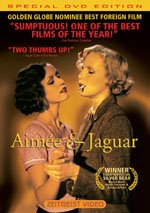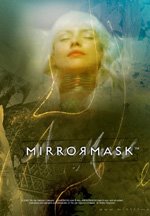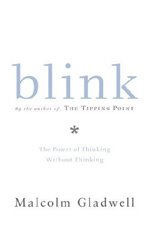End of the Line
This Blog has been moved. For more current entries, see the new location. Thanks.
Encountereds. I came, I saw, I commented.
 It is one of the secrets of the creative process that a bunch of people who sound like they haven't the first glimpse of what they are doing, or why, can produce something profound and moving. Comparing, in this case, the cast and crew interviews on the DVD with the movie itself, the dichotomy couldn't be greater. Where the movie is a masterpiece for so many reasons and in so many ways (and in spite of its occasionally stilted acting in the tradition of the German Kleines Fernsehspiel), the comments of the people who made it fall amazingly short. Most telling was Maria Schrade, who in the space of under two minutes mentioned no less than six times that the fact that it was a lesbian lovestory didn't matter at all. Form and function, quite at odds, but thanks for the effort.
It is one of the secrets of the creative process that a bunch of people who sound like they haven't the first glimpse of what they are doing, or why, can produce something profound and moving. Comparing, in this case, the cast and crew interviews on the DVD with the movie itself, the dichotomy couldn't be greater. Where the movie is a masterpiece for so many reasons and in so many ways (and in spite of its occasionally stilted acting in the tradition of the German Kleines Fernsehspiel), the comments of the people who made it fall amazingly short. Most telling was Maria Schrade, who in the space of under two minutes mentioned no less than six times that the fact that it was a lesbian lovestory didn't matter at all. Form and function, quite at odds, but thanks for the effort.

 The plot of this odd movie about the unlikely friendship between a drug enforcer cop and a big time coke dealer doesn't make too much sense, and the love story thrown in doesn't help either. The script at times seems incoherent, as though the writers didn't quite know where to take it. The hairdos and dresscode are a vivid reminder of everything that was bad about the eighties, but the single worst thing about this movie has to be the signature Sexophone that starts whining every time romance lurks in the shadows. Puh-lease. The highlight of the movie is Raul Julia as the mexican druglord Carlos. The plot surrounding him, especially the supposed eight years of covertly working with the DEA, without them knowing that he wasn't a Mexican official, diesn't make any sense, but his acting does.
The plot of this odd movie about the unlikely friendship between a drug enforcer cop and a big time coke dealer doesn't make too much sense, and the love story thrown in doesn't help either. The script at times seems incoherent, as though the writers didn't quite know where to take it. The hairdos and dresscode are a vivid reminder of everything that was bad about the eighties, but the single worst thing about this movie has to be the signature Sexophone that starts whining every time romance lurks in the shadows. Puh-lease. The highlight of the movie is Raul Julia as the mexican druglord Carlos. The plot surrounding him, especially the supposed eight years of covertly working with the DEA, without them knowing that he wasn't a Mexican official, diesn't make any sense, but his acting does.
 About halfway through the movie I realized that I was waiting in vain, and that the strong sense of tension probably wasn't going to be relieved by some big event. Turns out I was wrong, but I'd still say that this is a movie about ideas more than about events. An aging, repressed and puritan writer of mystery novels is sent to France to find inspiration, finds her missing psychological counterpart instead, in a young promiscuous and hedonisitic woman, and embraces her worldview, to return to her editor with a book that reflects her maturation. How much of the plot truly happened, and how much of it just reflects the story she writes is anybody's guess, but the cinematography and design is consistently geat and very subtle, and the atmosphere of unresolved tension is almost palpable throughout.
About halfway through the movie I realized that I was waiting in vain, and that the strong sense of tension probably wasn't going to be relieved by some big event. Turns out I was wrong, but I'd still say that this is a movie about ideas more than about events. An aging, repressed and puritan writer of mystery novels is sent to France to find inspiration, finds her missing psychological counterpart instead, in a young promiscuous and hedonisitic woman, and embraces her worldview, to return to her editor with a book that reflects her maturation. How much of the plot truly happened, and how much of it just reflects the story she writes is anybody's guess, but the cinematography and design is consistently geat and very subtle, and the atmosphere of unresolved tension is almost palpable throughout.
 The biggest corporate scandal of our time, explained. Before I saw this, I feared to see the ruthless and ingenious machinations of evil people would get me agitated without offering a way out. But to see the ruthless machinations of evil people leaves me incredulous for their lack of ingenuity, and the problem turns out not to be a few crooks, but a fundamentally flawed system. None of it should have happened, but scores of investment bankers and brokers fell for the nude emperor, because they had stock in non-clothing. Sure enough, there are a few monstrous moments, as when the Californian energy grid is played for money, but overall, it's just business as usual. How horrible.
The biggest corporate scandal of our time, explained. Before I saw this, I feared to see the ruthless and ingenious machinations of evil people would get me agitated without offering a way out. But to see the ruthless machinations of evil people leaves me incredulous for their lack of ingenuity, and the problem turns out not to be a few crooks, but a fundamentally flawed system. None of it should have happened, but scores of investment bankers and brokers fell for the nude emperor, because they had stock in non-clothing. Sure enough, there are a few monstrous moments, as when the Californian energy grid is played for money, but overall, it's just business as usual. How horrible.
 Neil Gaiman's work is a bit of a paradox to me. I like his storytelling and inventiveness - if sometimes reluctantly, for excessive use of pathos -, but visually he consistently seems to be balancing on the fringes of a realm of exuberant quirkyness and fantasy running wild that gives me the creeps for all the wrong reasons. This movie is no exception, with a neat twist on good/evil dichotomies, a likable set of characters, and oodles of visual frills. But several of the ideas here are so enjoyable (the birdmonkeys, sphinx/cats and the pair of giants being just three of the more memorable), that the flaws don't much matter. Maybe I can even bring myself to read the Sandman one of these days. Why? Because it's there.
Neil Gaiman's work is a bit of a paradox to me. I like his storytelling and inventiveness - if sometimes reluctantly, for excessive use of pathos -, but visually he consistently seems to be balancing on the fringes of a realm of exuberant quirkyness and fantasy running wild that gives me the creeps for all the wrong reasons. This movie is no exception, with a neat twist on good/evil dichotomies, a likable set of characters, and oodles of visual frills. But several of the ideas here are so enjoyable (the birdmonkeys, sphinx/cats and the pair of giants being just three of the more memorable), that the flaws don't much matter. Maybe I can even bring myself to read the Sandman one of these days. Why? Because it's there.
 Talk of this album constitutes almost an entire chapter of Galdwell's Blink. Apparently, many distinguished figures in the music industry heard Kenna's music and were deeply impressed, but when focus group testing was done, the audience was unimpressed, and radio stations were very reluctant to play Kenna's stuff. Gladwell uses this as an illustration of the fact that focus group testings aren't as meaningful as the judgments of experts and can be very misleading, but I beg to differ. Maybe the fact that one of those impressed experts was a member of U2, those toe curling dogooders, should have tipped me off - I am absolutely with the focus group on this one. This is lifeless, uninpsired music and doesn't speak to me at all. Maybe an entirely different argument could be made from this - about how too much expertise can drive you into the obscurity of private passions no non-expert can understand or appreciate. Or maybe U2 is just full of shit. I like that theory.
Talk of this album constitutes almost an entire chapter of Galdwell's Blink. Apparently, many distinguished figures in the music industry heard Kenna's music and were deeply impressed, but when focus group testing was done, the audience was unimpressed, and radio stations were very reluctant to play Kenna's stuff. Gladwell uses this as an illustration of the fact that focus group testings aren't as meaningful as the judgments of experts and can be very misleading, but I beg to differ. Maybe the fact that one of those impressed experts was a member of U2, those toe curling dogooders, should have tipped me off - I am absolutely with the focus group on this one. This is lifeless, uninpsired music and doesn't speak to me at all. Maybe an entirely different argument could be made from this - about how too much expertise can drive you into the obscurity of private passions no non-expert can understand or appreciate. Or maybe U2 is just full of shit. I like that theory.
 With the Tipping Point being so entertaining to read, the momentum just carried me right into Gladwell's newer book on the importance of subconscious snap judgments for all aspects of our lives. Of course there is quite some evidence saying that even when we make seemingly rational decisions, our brains may just be bullshitting us profoundly (in Gazzanigas famous experiments on split brain patients, for example, subjects readily report completely bogus reasons for an action, because the half of their brain speaking, having no clue why the other half did something, makes up a story - without the subject being aware that he's being conned by the gooey stuff in his head. But I digress), so the phenomenon that the resons for our decisions and actions aren't always available to our conscious self might just be the tip of the problem that we actually come up with explanations for our actions after the fact by default, and the only reason it tends to make sense so much is that we have been around ourselves long enough to generally know what we will be doing, and have a fairly good theory of our own minds. The most important part of this book I found to be the notion that we are able to shape how our subconscious makes its decisions, and the chapter on how requiring conscious justifications messes up and changes our judgments - unless we're experts and already know what we're talking about. Next time somebody asks you why you like something, think twice about thinking about it - you suddenly might not like it any more.
With the Tipping Point being so entertaining to read, the momentum just carried me right into Gladwell's newer book on the importance of subconscious snap judgments for all aspects of our lives. Of course there is quite some evidence saying that even when we make seemingly rational decisions, our brains may just be bullshitting us profoundly (in Gazzanigas famous experiments on split brain patients, for example, subjects readily report completely bogus reasons for an action, because the half of their brain speaking, having no clue why the other half did something, makes up a story - without the subject being aware that he's being conned by the gooey stuff in his head. But I digress), so the phenomenon that the resons for our decisions and actions aren't always available to our conscious self might just be the tip of the problem that we actually come up with explanations for our actions after the fact by default, and the only reason it tends to make sense so much is that we have been around ourselves long enough to generally know what we will be doing, and have a fairly good theory of our own minds. The most important part of this book I found to be the notion that we are able to shape how our subconscious makes its decisions, and the chapter on how requiring conscious justifications messes up and changes our judgments - unless we're experts and already know what we're talking about. Next time somebody asks you why you like something, think twice about thinking about it - you suddenly might not like it any more.
 I still remember being blown to pieces by Mononoke-hime, and it's hard to imagine anything ever will surpass Sen to Chihiro no Kamikakushi, but Hauro ranks a close (Totoro!) third in the Miyazaki charts. While the plot becomes impenetrable in more than one place, the mysteriousness of what's going on just adds to the dreamlike quality of the story. The fire demon is a delight, the design a visual triumph, and the characters, in their moral murkyness typical for Miyazaki, likable even when they are the closest anyone can come to evil in his universe. I could maybe have done with a little less screentime for his usual themes of the evils of war and industrialism, but since even those looked good, I won't bicker. See it if you haven't, see it again if you have.
I still remember being blown to pieces by Mononoke-hime, and it's hard to imagine anything ever will surpass Sen to Chihiro no Kamikakushi, but Hauro ranks a close (Totoro!) third in the Miyazaki charts. While the plot becomes impenetrable in more than one place, the mysteriousness of what's going on just adds to the dreamlike quality of the story. The fire demon is a delight, the design a visual triumph, and the characters, in their moral murkyness typical for Miyazaki, likable even when they are the closest anyone can come to evil in his universe. I could maybe have done with a little less screentime for his usual themes of the evils of war and industrialism, but since even those looked good, I won't bicker. See it if you haven't, see it again if you have.